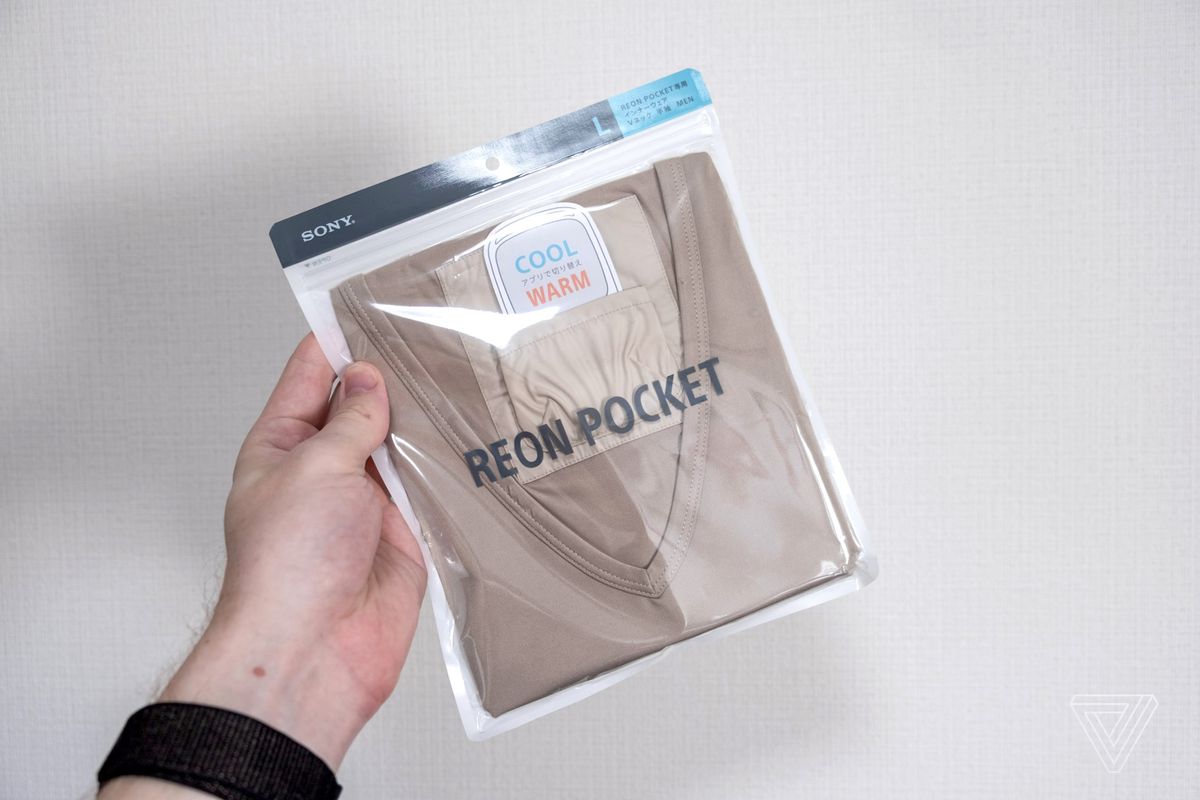I’ve lived in Japan for nearly twelve years, and I’m still not used to the awful summers. Between the high temperatures and suffocating humidity, stepping outside in July and August feels like being slowly cooked in a sous vide pot. As a seemingly interminable rainy season comes to an end, I’m not going to need much encouragement to stay home.
I don’t think my opinion on Japanese summers are particularly unusual, which is probably why Sony decided to go ahead with the Reon Pocket through its First Flight internal-startup-incubator-slash-crowdfunding-platform. First Flight has previously led to products like the FES E Ink watch, the Huis smart home universal remote, and the Wena Wrist modular smartwatch. Now we have the Reon Pocket, which can only be described as a wearable air conditioner, and I’ve been testing it out.
The Reon Pocket is a fairly slim palm-sized white plastic device that charges over USB-C and connects to your iOS or Android phone with Bluetooth. It definitely looks like a Sony gadget. There’s a silicone pad on the back that you can press against your skin, and the Reon Pocket uses the Peltier effect to cool or warm itself up by absorbing and releasing heat. You can use it handheld, but the most widely promoted use cases involves buying Sony’s special V-neck undershirts with a pocket on the inner back to keep the device resting between your shoulder blades.
:no_upscale()/cdn.vox-cdn.com/uploads/chorus_asset/file/20105778/DSCF7271.jpg)
The app is pretty simple and gives you direct control over the Reon Pocket’s temperature settings. There are three levels of cooling or warming, plus an additional boost mode that’s limited to two minutes and a control for the speed of the “fan.” You can also set automatic modes that kick in whenever you turn the device on with its own power button rather than using the app. It lasts around 2-3 hours on a charge, depending on the intensity of your settings.
The device only weighs about 80 grams, so beyond the cooling and warming effects it doesn’t really feel noticeable when you’re wearing it in the undershirt, and it doesn’t stick out beneath another layer of clothing. It is, however, a little awkward to insert it once the undershirt is on — you need to get a good fit in the pocket, which is hard to do with your hands behind your back. Maybe it gets easier with practice.
So, how does it work? Sony’s marketing suggests that it can reduce your body surface temperature by 13°C, for example from 36°C (96°F) to 23°C (73.4°F). I can believe that that’s the case at the point of contact, but the effect is clearly much less pronounced across the whole body, as Sony’s own pictures show.
:no_upscale()/cdn.vox-cdn.com/uploads/chorus_asset/file/20105780/Screen_Shot_2020_07_22_at_16.48.33.png)
I wore the Reon Pocket while walking to a supermarket about a mile away for lunch today. The temperature was only 30°C (86°F), so we’re not quite into the swing of a Tokyo summer just yet, but the humidity was pushing 80 percent — this is still the kind of walk that would normally turn me into a puddle of sweat soon enough. I did find, generally, that the Reon Pocket improved matters somewhat, even on its lowest cooling setting. I was definitely still sweating by the time I got home, but the cooling sensation does make a difference while you’re actually out there in the heat.
Basically, the Reon Pocket does what you’d expect any small, cold object to do when held against your skin. You’re still going to feel like you’re in a hot, sweaty environment, but you’ll take what you can get.
:no_upscale()/cdn.vox-cdn.com/uploads/chorus_asset/file/20105779/DSCF7272.jpg)
For me personally, I’m not sure the hassle of dealing with a weekly rotation of device-exclusive Sony undershirts would be worth it. But I’m in a position where I’ve been working from home for nearly a decade and my 2020 summer wardrobe consists almost exclusively of Toronto Raptors t-shirts. If I worked a job that involved a daily commute and business clothing, as is the case for tens of millions of people across Japan, I think the Reon Pocket could make more sense. As it is, I’d probably just use it as a pocket gadget that can act as a localized cooler or warmer in a pinch.
The Reon Pocket is out now exclusively in Japan. It costs 13,000 yen ($122) for the device itself, and the undershirts (available in white or beige) are 1,800 yen ($17) each. The app does work in English, if you’re looking to import.
